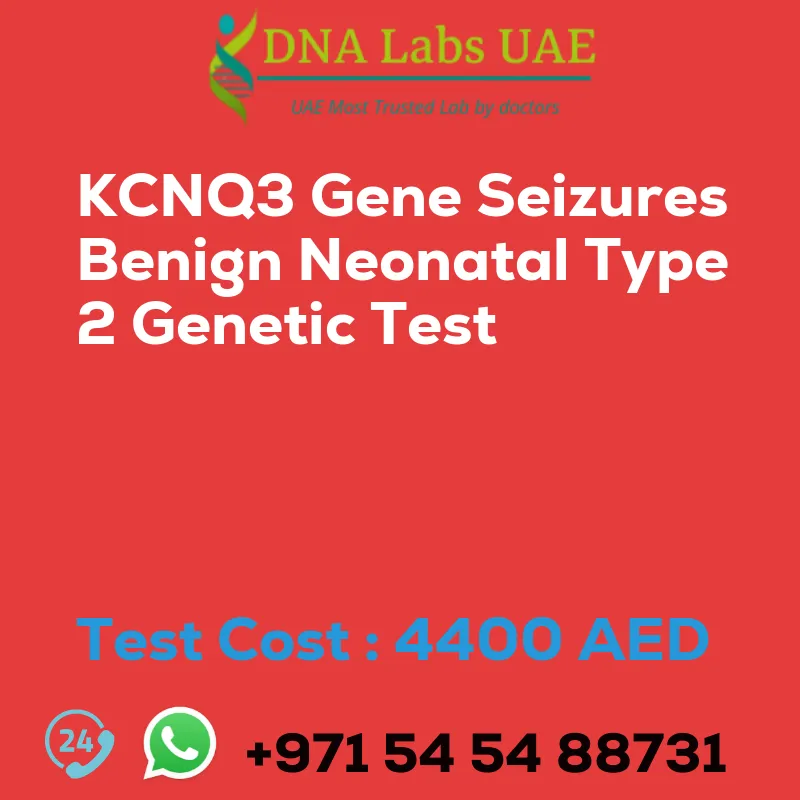KCNQ3 Gene Seizures benign neonatal type 2 Genetic Test
Components: KCNQ3 Gene Seizures benign neonatal type 2 Genetic Test
Price: 4400.0 AED
Sample Condition: Blood or Extracted DNA or One drop Blood on FTA Card
Report Delivery: 3 to 4 Weeks
Method: NGS Technology
Test type: Neurological Disorders
Doctor: Neurologist
Test Department: Genetics
Pre Test Information: Clinical History of Patient who is going for KCNQ3 Gene Seizures, benign neonatal, type 2 NGS Genetic DNA Test. A Genetic Counselling session to draw a pedigree chart of family members affected with KCNQ3 Gene Seizures, benign neonatal, type 2.
Test Details: The KCNQ3 gene is responsible for encoding a potassium channel that helps regulate the electrical activity in neurons. Mutations in this gene can lead to a condition called benign neonatal seizures, type 2. Benign neonatal seizures, type 2, is a rare genetic disorder characterized by seizures that typically start within the first few days of life and resolve by three to four months of age. These seizures are generally not associated with any underlying brain abnormalities and have a good prognosis, as they tend to resolve without any long-term neurological deficits.
NGS (Next-Generation Sequencing) genetic testing is a type of genetic testing that allows for the simultaneous analysis of multiple genes or even the entire exome (all the coding regions of genes) in a single test. It is a powerful tool for identifying genetic mutations associated with various diseases, including KCNQ3 gene mutations related to benign neonatal seizures, type 2. NGS genetic testing involves obtaining a DNA sample, typically through a blood or saliva sample, and analyzing it using specialized laboratory techniques. The DNA is sequenced, and the resulting data is analyzed to identify any genetic variations or mutations in the KCNQ3 gene or other relevant genes.
By performing NGS genetic testing, healthcare providers can confirm a diagnosis of benign neonatal seizures, type 2 by identifying specific mutations in the KCNQ3 gene. This information can be valuable for providing appropriate medical management, genetic counseling, and family planning guidance. It is important to note that genetic testing should be ordered and interpreted by healthcare professionals with expertise in genetics, such as geneticists or genetic counselors, to ensure accurate and appropriate interpretation of the results.
| Test Name | KCNQ3 Gene Seizures benign neonatal type 2 Genetic Test |
|---|---|
| Components | |
| Price | 4400.0 AED |
| Sample Condition | Blood or Extracted DNA or One drop Blood on FTA Card o |
| Report Delivery | 3 to 4 Weeks |
| Method | NGS Technology |
| Test type | Neurological Disorders |
| Doctor | Neurologist |
| Test Department: | Genetics |
| Pre Test Information | Clinical History of Patient who is going for KCNQ3 Gene Seizures, benign neonatal, type 2 NGS Genetic DNA Test A Genetic Counselling session to draw a pedigree chart of family members affected with KCNQ3 Gene Seizures, benign neonatal, type 2 |
| Test Details |
The KCNQ3 gene is responsible for encoding a potassium channel that helps regulate the electrical activity in neurons. Mutations in this gene can lead to a condition called benign neonatal seizures, type 2. Benign neonatal seizures, type 2, is a rare genetic disorder characterized by seizures that typically start within the first few days of life and resolve by three to four months of age. These seizures are generally not associated with any underlying brain abnormalities and have a good prognosis, as they tend to resolve without any long-term neurological deficits. NGS (Next-Generation Sequencing) genetic testing is a type of genetic testing that allows for the simultaneous analysis of multiple genes or even the entire exome (all the coding regions of genes) in a single test. It is a powerful tool for identifying genetic mutations associated with various diseases, including KCNQ3 gene mutations related to benign neonatal seizures, type 2. NGS genetic testing involves obtaining a DNA sample, typically through a blood or saliva sample, and analyzing it using specialized laboratory techniques. The DNA is sequenced, and the resulting data is analyzed to identify any genetic variations or mutations in the KCNQ3 gene or other relevant genes. By performing NGS genetic testing, healthcare providers can confirm a diagnosis of benign neonatal seizures, type 2 by identifying specific mutations in the KCNQ3 gene. This information can be valuable for providing appropriate medical management, genetic counseling, and family planning guidance. It is important to note that genetic testing should be ordered and interpreted by healthcare professionals with expertise in genetics, such as geneticists or genetic counselors, to ensure accurate and appropriate interpretation of the results. |








